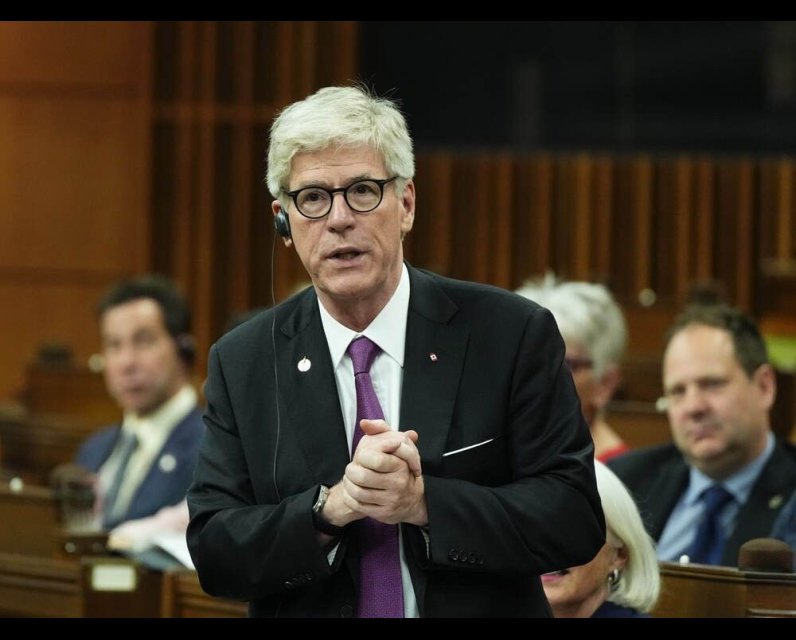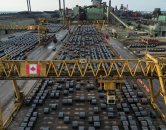Federal government could deal with Trudeau-era climate policies 'over time,' energy minister says

OTTAWA — Natural Resources Minister Tim Hodgson did not commit to scrapping Trudeau-era climate policies that Alberta and Ontario want to see gone but said that the newly adopted major projects bill could pave the way to doing so “over time.”
Speaking in Calgary on Friday, Hodgson said the new legislation — which enables the cabinet to quickly approve projects of national interest by overriding federal laws — will empower the government to act swiftly and any legislative fine-tuning would come later.
“We need to move quickly. What the… One Canadian Economy Act does is allows us to move quickly under this framework,” he told reporters in a press conference.
“It allows us to do all the things we need to do in one centralized place, under one set of timelines, and to take those learnings to go back and deal with the other acts over time.”
Hodgson was indirectly responding to a letter from the environment ministers of Alberta and Ontario, made public this week, who requested that the federal government repeal the Impact Assessment Act, clean electricity regulations and emissions cap, among others.
In their letter, Rebecca Schultz and Todd J. McCarthy argued that those climate policies, implemented by the prior Liberal government, would “undermine competitiveness, delay project development, and disproportionately harm specific provinces and territories.”
“Canada is poised to be an economic superpower, but achieving that potential depends on strong, constitutionally grounded provincial authority over resource development and environmental management,” they wrote to Environment Minister Julie Dabrusin.
Dabrusin, who met with her provincial and territorial counterparts in the Northwest Territories this week, said that the environment remains a priority for Prime Minister Mark Carney even as his government is getting ready to fast-track major projects.
“We know it’s very important to Canadians that as we do this, we’re doing it properly and that we’re doing it in a way that actually supports a strong country as a whole that takes into account our nature and the like,” she said in a press conference on Wednesday.
“So, I very much see it at the centre of the work that I’m doing and that we’re doing as a government,” Dabrusin added.
When asked in Calgary if the federal government would be able to attract private investments dollars with the current climate policies in place, Hodgson said Carney was “focused on results” and that the government would “figure out how to get there.”
Hodgson said there is already a lot of interest in building projects of national interest but remained relatively tight-lipped when asked about the possibility of a new pipeline.
Alberta Premier Danielle Smith has been pushing for a pipeline, built in tandem with Pathways Alliance, that would bring crude oil from Alberta to the Port of Prince Rupert, British Columbia. So far, B.C. Premier David Eby said that is unlikely to happen.
Hodgson said there has been “lots of discussions with various folks” around that project and that it is “something that’s being worked on actively.”
But he declined to spill more details about the lengths the government would go to to build a new pipeline. “In my previous life, I did a lot of deals. I never did a deal with the press. Those conversations are going on. They’re going to happen in private,” he said.
“When there’s a transaction, we’ll let everybody know, but you should assume that everyone is focused on trying to figure out how to make that happen.”
The major projects bill, known as C-5, was adopted in the Senate on June 26 and given royal assent the same day, becoming law, after being fast-tracked through the House of Commons.
The rushed passage of the bill raised concerns from environmental groups, who fear the government will bypass environmental safeguards to approve projects, and Indigenous peoples, who said the government did not properly consult with them beforehand.
To alleviate some of those concerns, Carney has pledged to hold summits during the summer with First Nations, Inuit and Métis peoples.
But there is more work to do, and more problems may arise in the process.
Hodgson said the federal government will be negotiating with each of the provinces and territories over the next six months to ensure major projects will be subject to one single environmental assessment, not two, in order to speed up the adoption of the process.
The perspective of possibly overriding provincial laws and regulations could prove to be a issue in Quebec and British Columbia, where 42 per cent and 32 per cent of people oppose the idea, according to recent polling from the Angus Reid Institute.
National Post calevesque@postmedia.com
Our website is the place for the latest breaking news, exclusive scoops, longreads and provocative commentary. Please bookmark nationalpost.com and sign up for our newsletters here.




Comments
Be the first to comment